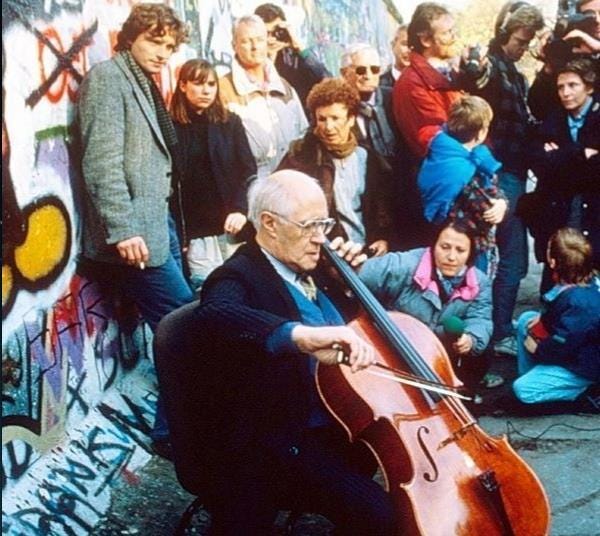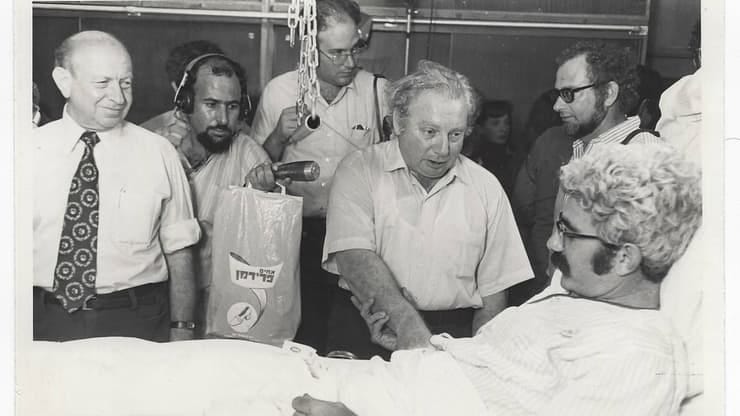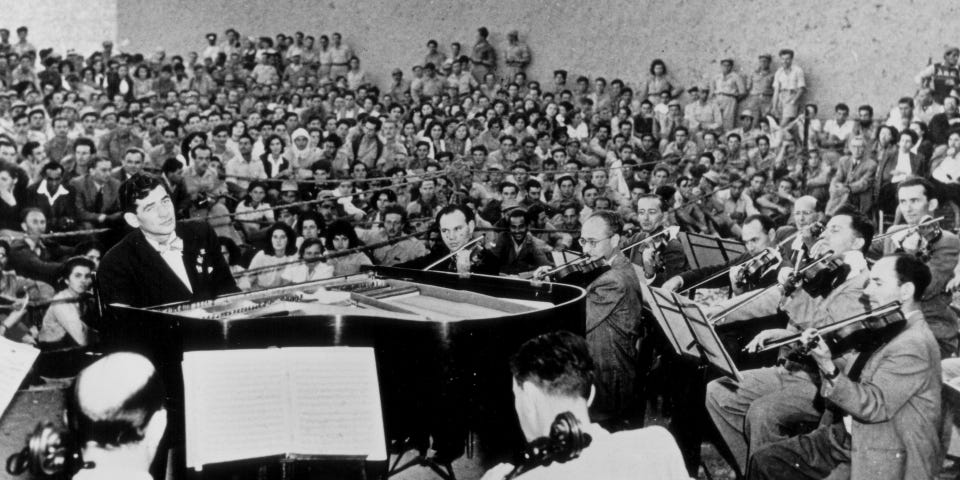Where Are Our Cultural Heroes?
How Stern, Bernstein, and Rostropovich fought for civilisation—and why no one does anymore
Once, soloists and conductors were cultural heroes. Toscanini, Stern, Rostropovich, and Bernstein are names that carried civilisational weight. They were not simply performers but symbols, embodiments of values, of freedom, of beauty, of civilisation itself.
Today, virtuosos still exist, but cultural heroes are a thing of the past. Why is this so, and why does it matter?
The story of Israel offers the clearest window into this loss. Nowhere else did cultural heroism burn so brightly or collapse so completely within living memory. The concerts, the gestures, the infrastructure these artists built, all of it is documented, recent enough to feel immediate, yet already impossibly distant. What happened there has happened everywhere, but in Israel, you can see it with unusual clarity: the moment when a culture stopped believing that beauty mattered as much as survival, and how that belief sustained survival itself.
Fighters in Their Own Way

A cultural hero is not a celebrity, nor merely a skilled technician. A cultural hero is someone who acts with conviction, who understands that music is not neutral but civilizational, that beauty is not leisure but a necessity for the human soul.
There are countless examples, and many can still be found online, immortalised. One of the most striking is Mstislav Rostropovich. As the Berlin Wall collapsed in 1989, he appeared alone with his cello, sitting beside the concrete that had divided families and killed so many who tried to cross it. He did not deliver a speech. He did not try to show himself as a moral celebrity. He simply understood the grandeur of that moment—the reunification of Germany after decades of tyranny—and he knew what he had to do. It was just him and Bach, giving sound to freedom’s victory.
In that same historic moment, Leonard Bernstein stood before a special orchestra made up of musicians from both East and West to perform Beethoven’s Ninth Symphony, perhaps the greatest musical testament to human brotherhood. In an act of sublime courage, he changed one word in the text: from “Ode to Joy” to “Ode to Freedom.” That single gesture, almost unthinkable today, crystallised the meaning of the hour. It was not only a concert—it was civilisation itself declaring triumph.
Years earlier, Isaac Stern had already shown what it meant to be a cultural fighter. He came again and again to the young state of Israel, playing not only in its cities but in kibbutzim and small settlements. These were modest audiences, sometimes just a handful of people—but Stern understood their significance. This was the rebirth of Jewish sovereignty, the people of Israel becoming masters of their own destiny. He felt the historic weight on his shoulders, and he chose to carry it in the best way he could: by giving them the gift of music.
But Stern did not stop at performing. He built. He established scholarship funds that sent Daniel Barenboim, Itzhak Perlman, and Pinchas Zukerman—and thousands of others—to study with the world’s greatest teachers. He founded the Jerusalem Music Centre. He brought Pablo Casals, the greatest cellist of the 20th century, to perform at Israel’s first festival in 1961, giving the young state instant cultural prestige. And when he identified exceptional talent, he did not hesitate to use his access: he walked into the office of Defence Minister Shimon Peres and asked him to release two young musicians—pianist Yefim Bronfman and violinist Shlomo Mintz—from military service after basic training so they could study abroad. Peres agreed. Because everyone understood: in a nation fighting for survival, cultivating genius was not a luxury but a civilisational necessity.
During the Yom Kippur War, Stern went from hospital bed to hospital bed, playing for wounded soldiers. During the Gulf War, he stood alone on the stage of Jerusalem Theatre and performed for an audience entirely wearing gas masks. He knew what he was doing: where death had sounded, life had to resound. [1]
As early as 1948, Leonard Bernstein flew into Israel during the War of Independence. At 29 years old, already a rising star in American music, he wrote to his mentor Serge Koussevitzky: “I feel that I shall spend more and more time here each year. It makes running around the cities of America seem so unimportant—as if I am not really needed there, while I am really needed here!” He conducted forty concerts in sixty days across the war-ravaged country, often with artillery fire audible mid-performance. At one concert, he was called offstage mid-Beethoven piano concerto and told of a possible air raid. He returned to the piano as if nothing had happened. Later, he said, “I never played such an Adagio. I thought it was my swan song.”
No concert better captured what cultural heroism meant than the one in Beersheba on November 20, 1948. Israeli troops had captured the strategic desert town and defied a UN order to withdraw. Bernstein arrived by armoured bus with thirty-five orchestra members, setting up a makeshift stage in an archaeological dig. There, before soldiers who had refused to retreat, he played three piano concertos in succession—Mozart, Beethoven, and Gershwin—while a violinist held his chair steady on the precarious platform. When Egyptian planes spotted what appeared to be troop concentrations, Egypt redeployed forces away from Jerusalem, fearing an imminent Israeli offensive. As Israel’s first president, Chaim Weizmann, later explained the Egyptian miscalculation: “Who would take time in war to listen to a Mozart concerto?” [2]
That was the answer: people who understood that beauty is not an ornament to survival, but its completion. Where death had sounded, life had to resound.
And perhaps the most magnificent example came after the reunification of Jerusalem in 1967. Leonard Bernstein returned, this time with the Israel Philharmonic, to conduct Mahler’s Second Symphony—the Resurrection. Could there have been a more fitting work for that moment? On Mount Scopus, before a vast crowd, he gave the sound of resurrection itself: a Jewish people, united once again in their capital, rising from centuries of exile. Bernstein did not pause to wonder what his critics in New York or London might say about him “taking sides”. He did not. He saw that history was calling, and he answered—with music.
They were not generals. They were not politicians. But they were fighters in their own way—fighting for civilisation with the only weapons they needed: their instruments, their conviction, and their courage.
Why They Disappeared
The deeper cause is that the framework itself has collapsed. Stern, Bernstein, and Rostropovich all had mixed ideas, some of them contradictory, some of them confused. But even within that, they still carried a basic conviction: that freedom mattered, that beauty mattered, and that evil had to be named and opposed. And when the moment demanded it, they stood.
And here is the point: these people did not give a thought to what others might think or say. They did not worry about being the darling of this or that protest movement. They did not measure their actions against the applause of polite society. Rostropovich had lived through Soviet oppression himself. He knew it was evil. That is why he went to the Wall in 1989 and played Bach—because evil had been defeated, and he knew it. The same with Bernstein. He went again and again to Israel, at so many historic moments, because he knew this was the power of good triumphing over evil.
It was, in the deepest sense, a matter of sense of life. These figures carried within them an attitude that the West is good and that anything opposing it is evil. Therefore, they went where history was clashing, where civilisation met its enemies, and they brought music there. Because that is what they did—they were musicians. That was the basic, almost instinctive orientation of their lives. And that sense of life has, tragically, almost vanished from today’s stage.
Today, that sense of life has been smothered. The fear of cancellation silences artists before they speak. Institutions that once defended art have been captured by the very relativism that denies truth and beauty. The grand civilisational narrative—the conviction that the West is good—has been dismantled, leaving no common stage where a hero can appear. Under these conditions, a cultural hero cannot be born.
And yet—we can still see what we’ve lost. The recordings survive. The footage endures. And sometimes, stumbling across them, we feel the ghost of what our culture once permitted.
Why It Matters
We still feel these moments because cultural heroism pierces time. I myself never knew Rostropovich until I stumbled, not long ago, on a historic recording: a Jerusalem Independence Day concert conducted by Zubin Mehta, with Stern, Jean-Pierre Rampal, and Rostropovich himself.
Teddy Kollek, the mayor of Jerusalem, introduced the concert with the chaos and improvisation so characteristic of Israel—how rushed everything was, how it was all last-minute, how they hadn’t even arranged Rostropovich’s visa in time. And yet somehow it all worked out. Because that is what mattered: not bureaucratic perfection, but bringing the world’s greatest artists to play the most beautiful music ever known to humanity, that was the statement: our independence means we are not merely surviving—we are living at the highest register of human civilisation.
I have included below a clip of this moment—Kollek’s introduction and Rostropovich’s entry—to give a sense of both the rushed, characteristically Israeli nature of it all, combined with the profound reverence for this man. Watch the audience stand as he enters. Watch that incredible smile. It contains everything.
When Rostropovich entered, cello in hand, with that enormous smile, many in the audience stood. They recognised him—not as a mere celebrity, but as a fighter like themselves. Here was a man who had been stripped of Soviet citizenship for defending Solzhenitsyn, who had paid the price for standing with dissidents, who knew what tyranny meant and what freedom cost. And he had chosen to come here, to Jerusalem, to celebrate with them. The audience knew it. He knew they knew it. That mutual recognition—that shared understanding of what his presence meant—filled the air.
I could instantly see that he was a special man. I imagined being a boy in Jerusalem, sitting in the Sultan’s Pool, watching him walk on stage. That memory would have lived with me forever. And yet here I was, decades later, feeling it as if it were my own.
But it was the ending that broke me. After the final notes, they all came together on stage—Rostropovich with his cello, Stern with his violin, Rampal with his flute, and Leontyne Price with her voice. And they played Hatikvah. Not sang it politely, not as a ceremonial closing—they played it, with their instruments, the same instruments that had given the world Bach and Beethoven. They consecrated their art to this moment, to these people, to this impossible survival. There was no separation between the pinnacle of Western civilisation and Jewish sovereignty. They were one thing.
The full concert is available in three parts on Kan’s archive.
How could you not burst into tears? These artists had that special smile—the smile of those who have lived through darkness and recognise light when they see it, who understand bone-deep what it means to stand here, alive, free, playing music in Jerusalem. That is what true cultural heroism means: it makes strangers into witnesses, and its echo reaches across decades to break your heart.
And yet today, too often, artists retreat into neutrality. Technique replaces conviction. Audiences accept concerts as polite leisure, not as cathedrals of meaning. Under the poison of relativism, beauty is treated as mere “taste,” not as truth. But survival without art is empty; victory without beauty is incomplete.
What We Must Do
So where are our cultural heroes? They are absent because artists stopped daring and audiences stopped demanding.
But more than that, they are absent because our culture has grown too cynical, too nihilistic, to allow them to exist. The twentieth century, with all its contradictions, still permitted such figures to arise and flourish. Today, the atmosphere itself chokes them. To be a cultural hero now would require a battle just to survive, just to be oneself, just to manifest conviction. And that is why they do not appear.
Imagine it today: in an age when vast crowds chant hatred of Israel, when the West itself doubts its right to exist—what would it mean for the greatest artists of our time to stand openly, unashamedly, in defence of freedom? There are a few courageous ones. But they are not the monumental figures of old, the universal symbols of civilisation and of the art they championed. Instead, we see too many artists embodying evil, elevating evil, and celebrating evil. In such a culture, heroes cannot be born.
And yet, Isaac Stern’s legacy offers a different lesson. He did not wait for the culture to permit him. He built what needed building: scholarship funds, concert halls, connections between talent and opportunity. He went to ministers and made his case. He identified children in peripheral towns and followed them for decades. He brought Casals to Israel and saved Carnegie Hall from demolition. Where the infrastructure was absent, he created it. Where conviction had faded, he embodied it.
Perhaps that is the answer we do not want to hear: that in a degraded culture, cultural heroism becomes harder but more necessary. That it requires not just talent and conviction, but the willingness to build institutions, to fight bureaucracies, and to spend fifty years doing the unglamorous work of making it possible for beauty to survive.
We need them. We need our Sterns, our Rostropoviches, and our Bernsteins. But perhaps what we need even more is to ask ourselves: what did Stern do that we are not doing? What infrastructure did he build that we have let collapse? What calls did he make that we are too timid to attempt?
Civilisation cannot endure on politics and war alone. Until we are willing to fight for it the way Stern fought—not with grand gestures alone, but with relentless, practical, decades-long commitment—we remain incomplete.
If you enjoyed Philosophy: I Need It, and want to see more, you can support my work by buying me a coffee. Every contribution makes a real difference. Thank you!
[1] Yossi Shifman, “דמות גדולה מהחיים: כך עיצב אייזק שטרן את המוזיקה בישראל” [A Larger-Than-Life Figure: How Isaac Stern Shaped Music in Israel], Ynet, July 23, 2020, https://www.ynet.co.il/entertainment/article/B1mvE5SxP.
[2] Susan Gould, “Leonard Bernstein in Beersheba, Israel, November 20, 1948,” Leonard Bernstein Office,
https://leonardbernstein.com/about/conductor/historic-concerts/beersheba-1948.




Wonderful, beautiful article, thanks so much for this. So many thoughts and memories it brought to mind!
There is hope, though.
Recently, we were informed that Itzhak Perlman took a stand at a Los Angeles concert when anti-American audience members protested against the US. He began playing and singing God Bless America and took the entire audience with him. A spontaneous stroke of genius and solidarity with a blessed country and Western civilisation itself.
On the dark side, recently two massive rock concerts saw horrifying behaviour from their lead singers: Chris Martin of Coldplay acknowledging his "discovery" that Israelis are human, and Vynil at Glastonbury ( Death to the IDF) . The brutal reality of this nefarious use of music shows the profound decadence of our civilisation.
When the Israel Philharmonic performed in San Francisco and New York the anti-Israel crowds followed them. We must also remember Zubin Mehta, nowadays quite ill, who was like another Israeli, loyal and proud of Israel, since he was 25 years old. The musicians used to say that Bernstein was their Moses, and Zubin was their Joshua.
I was lucky in my life to have met and worked with Zubin, Isaac Stern( he was present at my conducting debut with the Israel Philharmonic, conducting The Rite of Spring ,whilst expecting my first child, eight months into it), Leonard Bernstein, with whom I studied in Germany and shared the stage at Tanglewood, and Rostropovich, whom I invited to perform Dvorak's
Concerto with me and one of my orchestras, and who subsequently stayed for my leading of Tchaikovsky's Fifth, being shockingly complimentary, and giving me tips from his experience.
Oh, how I miss them.
The only chronicle I've read on the birth of the State of Israel in Exodus, until now. Thank you, well done, sir!